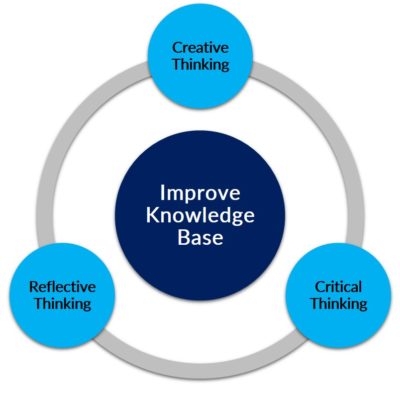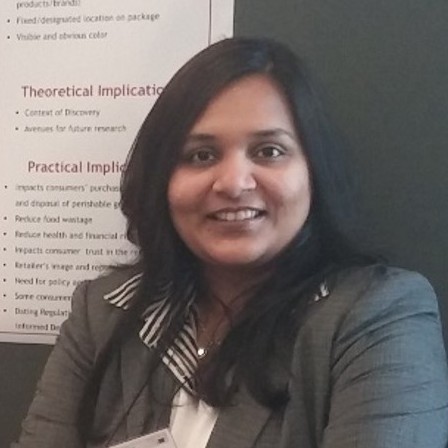Pedagogical knowledge includes useful ways of representing and formulating the subject matter such that one can make it comprehensible to others. Knowledge of pedagogical approaches bridges the gap between knowledge of the subject matter and the practice of teaching that subject matter. Multiple sources of evidence can be presented to showcase a teacher’s knowledge of pedagogical approaches.
Knowledge of Pedagogical Approaches

In today’s dynamic business environment, marketing professionals are expected to be proficient in all three types of questioning, or forms of thinking. They need to be able to produce innovative ideas (creative thinking), evaluate them in terms of organizational objectives (critical thinking), and then evaluate the outcomes of their efforts to become more effective in future (reflective thinking). Therefore, as a marketing teacher, it is my duty to create a classroom environment (stimulating yet non-competitive and non-intimidating) that is conducive to spark off a culture of inquisitiveness among students. This is important because as a teacher I cannot force or trick my students into learning, as it is an active participatory process. Thus, my teaching strategy is to shift the educational focus from being only marketing content-driven to augmenting students’ thinking ability so that they can adapt their marketing knowledge to the unpredictable and dynamic world of business.
When I reflect upon my past as a student in a business course, I can relate very well to what a business student is looking for in a teacher teaching a marketing course. I had the opportunity of studying business not only in India but also in the US. There is a major difference in the teaching styles and methods of teachers in these two countries. In India, pedagogy is mainly theoretical and content-driven while in the US, I experienced active learning, critical thinking, and practical application of theories learned in class. When the class is just textbook-based, students get bored of listening to lectures and writing exams. So, I attempt to make learning a fun activity for my students.
I studied business in India without any relevant work experience. Later, I worked in the marketing function of retail and real estate companies in India for four years before studying business in the USA. This changed my perspective towards business studies. After my work experience, I could understand and relate better to the concepts and frameworks that were being taught. Therefore, I believe that only classroom theory is not as useful as when it is combined with practical application or real-world examples. Especially in the field of marketing education, it is not possible for students to identify with the definitions of terms, concepts, frameworks, or theories unless they have had some work-experience in the marketing function or some relevant real-world examples or case studies are discussed in class with them. I use real world stories and cases to not only enhance my students’ learning experience but also to ignite the spark of curiosity and give them a platform to present their creative thinking, critical thinking and understanding of the material taught. I also make an effort to generate a process of reflective thinking among students which involves evaluative thinking of what has already occurred. This is important because it enables them to ponder over what is done, analyze it, and learn out of the successful and unsuccessful actions they undertook. Some classroom assignments that I use to generate creative, critical and reflective thinking are 1.) in-class active learning activities and 2.) case discussions or role playing, where students first critically analyze the situation, reflect upon what could have been done, and finally provide creative solutions to solve the problem.
I believe that asking questions and finding answers to those questions advances our knowledge base. Applying that knowledge base makes us wise. Enthusiasm and motivation can work wonders if fueled by inspiration and creativity. Thus, the hallmark of a great teacher is to inspire her students and to ignite the spark of creative thinking in the minds of her students. For example, in the context of marketing education, my goals are to: a.) Cultivate the curiosity in marketing thinking and b.) Develop (cultivate, promote and nurture) a “habit of curiosity” about marketing in everyday practice. (Hill & McGinnis, 2007, p.55). I encourage my students to ask questions in order to trigger discussions in class and enhance learning.
Teaching is a life-long learning process. When we teach, we learn at the same time. I think that a good teacher not only keeps the ‘fire of learning more’ burning inside her but also inspires her students to adopt that view towards learning. If one aspires to teach, one should never discontinue learning and therefore I consider myself a perpetual learner. Furthermore, one can teach students a few lessons everyday; but if one can teach them to learn by creating curiosity, they will continue learning all their lives by being motivated self-learners. This is a very important quality in this competitive world. All through their professional life, students will be successful only if they keep themselves updated to the new information churned out in their respective fields every day.
I have a positive confidence that all students, when given the right tools and guidance, can improve their learning and application of knowledge. Moreover, I have my principles that guide me toward being a good teacher – organization, thorough knowledge about the area of instruction, openness, sincerity, adaptability to diversity, student-friendliness, empathy, respect, infotainment (information through entertainment), and flexibility. I imbibe all these in my teaching style and endeavor to arouse a love for learning in my students. ‘Thinking and learning’ should become a life-long fun activity for them after attending my class.
“Education’s purpose is to replace an empty mind with an open one.” – Malcolm S. Forbes
I have several responsibilities as a teacher, adviser, marketing scholar, and a perpetual learner.
As a teacher:
I currently teach two courses at Worcester Polytechnic Institute:
- Achieving Strategic Effectiveness (BUS 4030) is a seven-week undergraduate course that is offered twice a year. Approximately 30-48 students enroll in each offering. The students are business majors from FBS and business minors from mainly STEM disciplines across the WPI campus.
- Marketing Research (MKT 562) is a graduate course offered in Spring every year. It is a required course for marketing majors and an elective for other business majors. I recommended its addition to the graduate marketing curriculum in a curriculum redesign process. Upon the school’s acceptance, I developed and offered this course for the first time in 2014.
As an adviser:
At WPI I also play a dual advising role: (1) Academic advising and (2) Project advising
Academic Advising involves guiding students continuously and consistently in pursuing meaningful educational plans, which are compatible with their life and career goals. Effective academic advising is the cornerstone of any academic program because students and universities cannot accomplish their desired goals if students are not provided thoughtful support as they deal with the many choices available to them. Thus, my role as an academic adviser promotes development of self-directed and motivated students and advances them toward the successful completion of degree requirements and timely graduation.
At WPI, professors provide academic advising to students to help them develop meaningful educational plans that are compatible with life goals. I have offered academic and career advice to over eighty undergraduate and graduate students. In addition to providing advising resources (through a Canvas site)and one-on-one meetings with advisees, I have been organizing an annual advising meet for my advisees since 2015 that guides them on developing an educational plan at WPI keeping in mind their interests, career objectives, and life goals. I also advise them on career opportunities, skills they need to develop (in class and using other resources) in order to find their dream job, how they can surf the job market in the U.S., and some information on the U.S. work culture, since most of my advisees are international students.
Project Advising involves guiding students as they complete their Interactive Qualifying Project (IQP) in the junior year. IQP is a distinctive interdisciplinary project experience that challenges students to examine the impact of science and technology on society to address social issues and human needs. It is a vital component of WPI’s project-based learning model. My responsibility as a project adviser includes establishing appropriate expectations with respect to the level and scope of work involved in an IQP, communicate these expectations clearly to students at the beginning of project work, guide and support students throughout the project, and finally evaluate the project deliverables.
As a research scholar:
I believe in the scholarship of teaching and learning because teaching is the core aspect of an academician’s identity and it bridges that gap between teaching and research. Therefore, it is an integral part of my research agenda. My research interest in business education stems from experiential learning and teaching effectiveness. One project that I have been working on attempts to understand how academic emotions are linked with the process of experiential learning. Another project is focused on enhancing teaching effectiveness through development of teaching portfolios based on a pedagogical competence framework.
As a perpetual learner:
I believe that one who dares to teach much never cease to learn. In order to keep myself updated about teaching techniques and enhancing my teaching skills, I attend several teaching seminars organized by the Teaching and Learning Center and Academic Technology Center at WPI. The seminars cover a range of interesting topics such as, experiential learning, service learning, teaching the next generation, use of social media in teaching, teaching online courses, using games to teach, and using new educational technologies in class. I also attend pedagogy conferences and marketing education track sessions in marketing conferences because I believe that along with knowledge creation, knowledge dissemination is also an equally important function of academia.
- Teaching methods
- MKT 562: Flipped design, In-class active learning exercises, Marketing Research lab sessions, Case analysis
- BUS 4030: In-class active learning exercises, Case analysis
- Teaching innovation (BUS 4030)
- Nominated for the 2018 Romeo L. Moruzzi Young Faculty Award for Innovation in Undergraduate Education
- Student evaluations
- Service to Teaching
- Serving on WPI FSoB’s Graduate Program and Curriculum Committee
- Participate in MS (Marketing & Innovation) curriculum revision
- Conduct AACSB AOL assessments in BUS 4030 and MKT 562
- Serving as the internship advisor for MS (Marketing & Innovation) students
- Serving on the doctoral committee of Qingyun Zhu
- Courses and workshops attended for improving knowledge of pedagogical approaches
- Practicum in Higher Education Course at Texas Tech University
- Harvard Business School – Case Teaching workshop
- Powerful Tools for Teaching and Learning: Web 2.0 Tools by Coursera
- Blended Learning: Personalizing Education for Students by Coursera
- Foundations of Virtual Instruction by Coursera
- LINKs simulation training webinar
- Harvard Business Publishing – Data Analytics simulation webinar
- Attended seminars and workshops organized by the Teaching and Learning Center at WPI
- Alumni Perspectives on Project Advising
- Flipping without Flopping: Real-world Experiences with Classroom Flips
- Academic Advising 101: Speed Networking Style
- Getting Involved in IQP Advising
- Game-Based Learning, Collateral Learning and Beyond
- The impact of online teaching on how I teach face to face classes
- More in Four: Opportunities and Challenges
- Beyond Student Ratings: Gathering other Forms of Evidence to Reflect on and Document Teaching Effectiveness
- Day workshop – How to Deepen Learning Using Critical Reflection?
- Would WPI Benefit from Adopting a Framework for Project-Based Learning?
- Alternatives to the Standard “IQP Report”
- Attended marketing education sessions in conferences
- Academy of Marketing Science Conference
- AMA Summer Educator’s Conference
- AMA Winter Educator’s Conference
- Attended teaching and pedagogy conferences
- Marketing Management Association Fall Educator’s Conference
- Read pedagogy journals and blogs to remain up-to-date with advancements in teaching methods and technologies
- Journal of Marketing Education
- Journal of Management Education
- Academy of Management Learning and Education
- Chronicle of Higher Education
